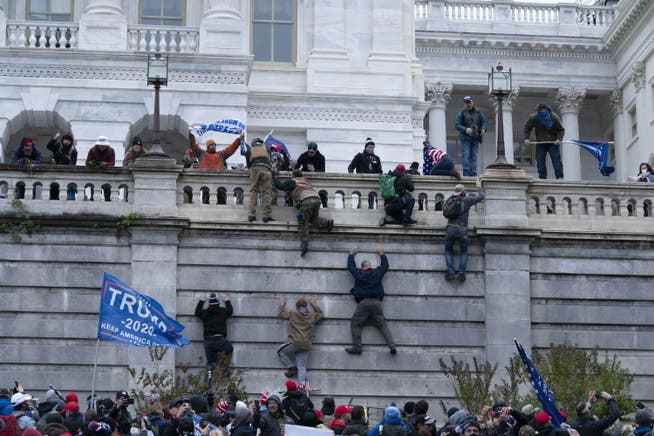At the last minute, the American Congress passes an important reform to protect the presidential elections: the new Electoral Count Act is intended to prevent another storming of the Capitol.
With an adventurous interpretation of the Electoral Counts Act, Donald Trump incited his supporters, who stormed the Capitol on January 6, 2021.
Just before the Christmas holidays, the US Senate passed a massive $1.7 trillion spending bill by a vote of 68 to 29 on Thursday. The so-called omnibus bill pledges a further $45 billion in aid to Ukraine through September. However, it also includes a reform of the Electoral Count Act (ECA). With an adventurous interpretation of this outdated law from 1887, Donald Trump wanted to turn his electoral defeat into a victory two years ago.
The ECA regulates how the so-called electoral votes are counted and certified. In American presidential elections, electoral votes decide victory or defeat. Each member state may cast a certain number of these votes based on its population size. These are based on the result of direct popular elections. The candidate who wins the majority of the people in a state receives all the electoral votes.
Vice President’s role is ceremonial only
Trump and his legal adviser, John Eastman, tried to use loopholes in the law to overturn the outcome of the popular election. Under the pretense of false allegations of fraud, they urged local parliamentarians and other state officials to declare the popular election “failed” and to appoint alternative electors. At the same time, Trump put massive pressure on his Vice President Mike Pence. As Chair of the assembled Congress, on January 6, 2021, his job was to oversee the certification of electoral votes. However, Trump claimed that as Vice President Pence could reject electoral votes from individual states and replace them with others in order to make him a quasi-electoral winner.
Because Pence stood his ground, Trump called his supporters to a demonstration in Washington on January 6 and had them march to the Capitol. That morning he is said to have called Pence a “coward” in a telephone call. In his speech and in tweets a little later, he accused his deputy of being discouraged. As the violent mob entered the Houses of Parliament, the rioters chanted: “Hang Mike Pence!”
That reformed law therefore clarifies the role played by the Vice President as Chair of the assembled Congress in certifying the election result. His task is only “of a ministerial nature”, according to the law. It is not in the power of the Vice President alone to decide on the validity of electors and to reject them. At the same time, the hurdle for appeals against electoral votes will be raised. So far, a single senator and one member of the House of Representatives have sufficed. One fifth of the parliamentarians in both chambers must now sign an objection. However, this may only happen for two reasons: if the electors of a member state were not legally certified or electoral votes were not cast regularly.
The reform also rescinds a passage in the 1845 law that allowed state legislatures to declare a popular election “failed.” This will protect the democratic election result in all member states, it is said in a summary of the law change. To prevent alternative lists of electors from being circulated, only the governors are now authorized to submit these lists to Congress.
A victory for the political center
With the renewal of the Electoral Count Act, lawmakers have learned important lessons from the storming of the Capitol. Democratic and Republican senators have been working on the reform for months. This shows that despite political polarization, bipartisan compromises in the interests of the common good are still possible in the US. On Friday, the Democratic majority in the House of Representatives also approved the omnibus bill. The reform got through Congress just in time for the Republicans to take control of the Grand Chamber in January.
After November’s midterm elections, which went off without a hitch, the reform is another signal of the strength of American democracy. The majority of voters want moderate and constructive politics in Washington. As a result, many die-hard Trump candidates lost their races in important swing states. In a video message, Trump called on Republican senators on Thursday not to pass the “ridiculous” and “monstrous” omnibus bill. But a large part – a total of 18 conservative senators – voted in favor of it anyway.

